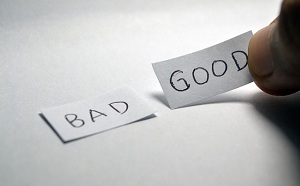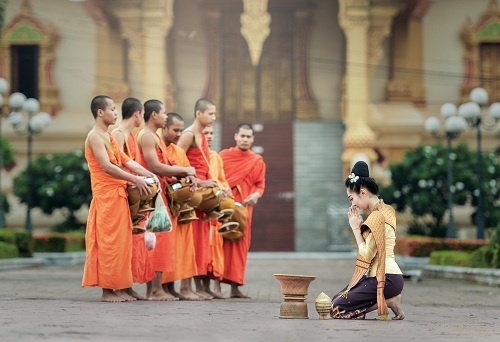Why Do Good?
Posted on: 29 May 2018
“Are we naturally good or bad?” A question society has pondered for generations.
 | Though we may do small little bad deeds like telling white lies or accidentally using bug spray out of panic from seeing a cockroach, we still end up feeling bad and would try to do more good; but why? Why is there such a concept to do good? To compensate for the bad things we did? Are we just drawn to do good deeds? Do we do it with expectations that others will return in favour of our deeds? Or is there something deeper than all these? On such a special occasion, Vesak Day is here and I decided to talk a bit more about this since most of our trips focuses on Buddhist pilgrimages. |
I remember one day, my colleague suddenly asked “Why do you believe in Buddhism?” The first thought that came to my mind was “It seemed like the most logical belief that could explain and support science, in my point of view.” I am not here to point at other religions as “illogical” and promote Buddhism, but as someone who has always been fascinated by science, Buddhism managed to explain a lot of things – even things science has yet to discover. I do truly believe in the Five Precepts (abstain from killing, stealing, sexual misconduct, false speech, and intoxication), which I often see in a lot of religions – not only Buddhism.
However, with what I see and witness from myself, though it may seem easy to follow the Five Precepts, it isn’t. Despite only consisting of 5 precepts, it is still difficult to truly follow them. Sure you may not kill chickens for people to eat, but you still try to get rid of pesky ants or house pests with harmful chemicals. Or you speak small little white lies because you do not want to hurt others feelings.
It takes a lot of consciousness to truly follow the 5 Precepts, and to people who truly believes in karma, they will try to do as much good deed and follow the precepts. As they believe that by doing good deed they will attain something good in the future.

But why?
Doing good makes you feel good.
Imagine a grandma dropping her oranges because her plastic bag was too weak, you could’ve just let her pick it all up herself, but some would help. Even though you gain nothing in return, you still do so. One reason why we do good is because it feels good to help others. The feeling to put a smile on a desperate face makes you feel happy.
Doing good gives you self-respect and you get respected by others.
Take the same scenario, by helping out a poor grandma, others will notice and set a “good image” of you as a nice person. Though to some who may want to debate on this matter will say it all comes down to the good intentions, people will judge you (like it or not) from what you do. By helping a helpless grandma, people will respect you because you put value in society.
Now why “self-respect”? Hypothetically, you would be a “nice person” if you “get away with a bad deed”, but I believe that to be truly happy – an aim most religions go for – one must first have some self-respect. Of course, this is a debatable topic, but in the end, self-respect is a major key to true happiness.
Doing good “gives you a higher chance to go to Heaven”
And on this special occasion, this is something we hear about a lot. Do more good deeds, get a chance to go to Heaven. Hearing this sure makes me feel “I wish the dead could come back and tell us if it’s true or not” but sadly we all know nothing lasts forever in the mortal world. Now major religions believe that doing more good would give you a higher chance of going to Heaven.
This reasoning connects with the previously mentioned reasons. But the main point in this reason is that we believe that doing alleviates us from our suffering and others suffering. Why do I say so? We do good because we sense the suffering of others (eg; helping poor villages, donating for people in need, adopt injured animals), in a sense, we are them. By connecting with others, we understand more about ourselves and open up our mind and perspective to the world around us. As a result of an open mind, you get closer to achieving true happiness, giving you a higher chance to go to Heaven.
All in all, though it may seem like you don’t get anything back from doing good, that should not stop you from doing good deeds. If you need a start, maybe just start by simply holding the door for stranger, give a seat to the elderly or anyone who needs it more, or saying a simple “Have a nice day” to that cashier guy you meet while buying bubble tea or McDonalds. Besides, doing good does not always have to be a contract where you expect others to repay. Instead, we can all start doing good to connect one another, and make altruism as a natural act rather than an unnatural phenomenon.
Want to join us to do good deeds?
We will be heading to Laos on December 2018 to help poor villages and give toys to children who don’t have anything to play with.
